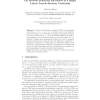Free Online Productivity Tools
i2Speak
i2Symbol
i2OCR
iTex2Img
iWeb2Print
iWeb2Shot
i2Type
iPdf2Split
iPdf2Merge
i2Bopomofo
i2Arabic
i2Style
i2Image
i2PDF
iLatex2Rtf
Sci2ools
112
click to vote
CPAIOR
2007
Springer
2007
Springer
On Boolean Functions Encodable as a Single Linear Pseudo-Boolean Constraint
A linear pseudo-Boolean constraint (LPB) is an expression of the form a1 · 1 + . . . + am · m ≥ d, where each i is a literal (it assumes the value 1 or 0 depending on whether a propositional variable xi is true or false) and a1, . . . , am, d are natural numbers. An LPB is a generalisation of a propositional clause, on the other hand it is a restriction of integer linear programming. LPBs can be used to represent Boolean functions more compactly than the well-known conjunctive or disjunctive normal forms. In this paper, we address the question: how much more compactly? We compare the expressiveness of a single LPB to that of related formalisms, and give an algorithm for computing an LPB representation of a given formula if this is possible. Note: This report is the long version of [18] and contains the proofs omitted there for space reasons.
CPAIOR 2007 | Integer Linear Programming | Linear Pseudo-Boolean Constraint | Propositional Variable Xi |
Related Content
| Added | 07 Jun 2010 |
| Updated | 07 Jun 2010 |
| Type | Conference |
| Year | 2007 |
| Where | CPAIOR |
| Authors | Jan-Georg Smaus |
Comments (0)

